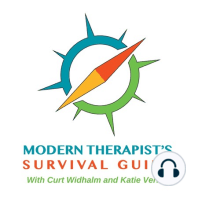32 min listen

What is Our Fascination with Anything Vaguely Neuroscience?
FromThe Modern Therapist's Survival Guide with Curt Widhalm and Katie Vernoy
What is Our Fascination with Anything Vaguely Neuroscience?
FromThe Modern Therapist's Survival Guide with Curt Widhalm and Katie Vernoy
ratings:
Length:
35 minutes
Released:
Apr 24, 2023
Format:
Podcast episode
Description
What is Our Fascination with Anything Vaguely Neuroscience?
Curt and Katie chat about our profession’s fascination with neuroscience. We explore the myths about the brain, why therapists lean on neuroscience (even when they really shouldn’t), and how “neuro” is misused and can actually be harmful to our clients.
Transcripts for this episode will be available at mtsgpodcast.com!
In this podcast episode we talk about neuroscience
Curt has started to get frustrated with all of the ways that neuroscience is misused. Curt is frustrated with the ongoing use of “neuro” information that may be myth.
What are the most common neuromyths?
Humans only use 10% of our brains
Left/Right Brain preference
Learning style (i.e., auditory, visual, or kinetic learners)
If you don’t drink enough water, your brain will shrink
Why do therapists often privilege “neuroscience” over everything else?
The fascination with brain scans
The belief that explanations including neuroscience are more effective (even if they are not)
Interest in data and the scientific explanations
The Misuse of “Neuro” to increase the credibility of other concepts
The “neuroscience” of the power of attraction
Overusing neuroscience explanations for interventions that don’t help
The potential for clients to feel incompetent due to trying to access parts of the brain versus understanding the interventions in a basic and complete manner
Resources for Modern Therapists mentioned in this Podcast Episode:
We’ve pulled together resources mentioned in this episode and put together some handy-dandy links. Please note that some of the links below may be affiliate links, so if you purchase after clicking below, we may get a little bit of cash in our pockets. We thank you in advance!
Article: The Seductive Allure of Neuroscience Explanations by Deena Skolnick Weisberg, Frank C. Keil, Joshua Goodstein, Elizabeth Rawson, and Jeremy R. Gray
Article: Dispelling the Myth: Training in Education or Neuroscience Decreases but Does Not Eliminate Beliefs in Neuromyths by Kelly Macdonald, Laura Germine, Alida Anderson, Joanna Christodoulou and Lauren M. McGrath
Article: Brain Images Make Cognitive Research More Believable
Article: Neuroscience and education: myths and messages
Article: Brain images make the article seem more reliable
The manifested article that has not been vetted for scientific accuracy, but I can’t believe I found it: The Neuroscience of The Secret
Stay in Touch with Curt, Katie, and the whole Therapy Reimagined #TherapyMovement:
Patreon
Buy Me A Coffee
Our Linktree: https://linktr.ee/therapyreimagined
Modern Therapist’s Survival Guide Creative Credits:
Voice Over by DW McCann https://www.facebook.com/McCannDW/
Music by Crystal Grooms Mangano https://groomsymusic.com/
Curt and Katie chat about our profession’s fascination with neuroscience. We explore the myths about the brain, why therapists lean on neuroscience (even when they really shouldn’t), and how “neuro” is misused and can actually be harmful to our clients.
Transcripts for this episode will be available at mtsgpodcast.com!
In this podcast episode we talk about neuroscience
Curt has started to get frustrated with all of the ways that neuroscience is misused. Curt is frustrated with the ongoing use of “neuro” information that may be myth.
What are the most common neuromyths?
Humans only use 10% of our brains
Left/Right Brain preference
Learning style (i.e., auditory, visual, or kinetic learners)
If you don’t drink enough water, your brain will shrink
Why do therapists often privilege “neuroscience” over everything else?
The fascination with brain scans
The belief that explanations including neuroscience are more effective (even if they are not)
Interest in data and the scientific explanations
The Misuse of “Neuro” to increase the credibility of other concepts
The “neuroscience” of the power of attraction
Overusing neuroscience explanations for interventions that don’t help
The potential for clients to feel incompetent due to trying to access parts of the brain versus understanding the interventions in a basic and complete manner
Resources for Modern Therapists mentioned in this Podcast Episode:
We’ve pulled together resources mentioned in this episode and put together some handy-dandy links. Please note that some of the links below may be affiliate links, so if you purchase after clicking below, we may get a little bit of cash in our pockets. We thank you in advance!
Article: The Seductive Allure of Neuroscience Explanations by Deena Skolnick Weisberg, Frank C. Keil, Joshua Goodstein, Elizabeth Rawson, and Jeremy R. Gray
Article: Dispelling the Myth: Training in Education or Neuroscience Decreases but Does Not Eliminate Beliefs in Neuromyths by Kelly Macdonald, Laura Germine, Alida Anderson, Joanna Christodoulou and Lauren M. McGrath
Article: Brain Images Make Cognitive Research More Believable
Article: Neuroscience and education: myths and messages
Article: Brain images make the article seem more reliable
The manifested article that has not been vetted for scientific accuracy, but I can’t believe I found it: The Neuroscience of The Secret
Stay in Touch with Curt, Katie, and the whole Therapy Reimagined #TherapyMovement:
Patreon
Buy Me A Coffee
Our Linktree: https://linktr.ee/therapyreimagined
Modern Therapist’s Survival Guide Creative Credits:
Voice Over by DW McCann https://www.facebook.com/McCannDW/
Music by Crystal Grooms Mangano https://groomsymusic.com/
Released:
Apr 24, 2023
Format:
Podcast episode
Titles in the series (100)
Managing Your Online Reputation: Curt and Katie talk about navigating through negative Yelp Reviews, Google Searches, and Therapist Facebook Groups by The Modern Therapist's Survival Guide with Curt Widhalm and Katie Vernoy